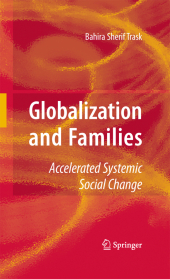 Neuerscheinungen 2014Stand: 2020-02-01 |
Schnellsuche
ISBN/Stichwort/Autor
|
Herderstraße 10
10625 Berlin
Tel.: 030 315 714 16
Fax 030 315 714 14
info@buchspektrum.de |

Bahira Trask
Globalization and Families
Accelerated Systemic Social Change
2010. 2014. xvii, 220 S. 235 mm
Verlag/Jahr: SPRINGER, BERLIN; SPRINGER NEW YORK; SPRINGER 2014
ISBN: 1-489-98472-0 (1489984720)
Neue ISBN: 978-1-489-98472-2 (9781489984722)
Preis und Lieferzeit: Bitte klicken
Incorporating concepts of globalization into family research introduces a new, unstudied dimension into the understanding of family dynamics. In forging a link between globalization and families, this book highlights the complex relationship between the two.
As our world becomes increasingly interconnected through economic integration, technology, communication, and political transformation, the sphere of the family is a fundamental arena where globalizing processes become realized. For most individuals, family in whatever configuration, still remains the primary arrangement that meets certain social, emotional, and economic needs. It is within families that decisions about work, care, movement, and identity are negotiated, contested, and resolved. Globalization has profound implications for how families assess the choices and challenges that accompany this process. Families are integrated into the global economy through formal and informal work, through production and consumption, and through their relationship with nation-states. Moreover, ever growing communication and information technologies allow families and individuals to have access to others in an unprecedented manner. These relationships are accompanied by new conceptualizations of appropriate lifestyles, identities, and ideologies even among those who may never be able to access them.
Despite a general acknowledgement of the complexities and social significance inherent in globalization, most analyses remain top-down, focused on the global economy, corporate strategies, and political streams. This limited perspective on globalization has had profound implications for understanding social life. The impact of globalization on gender ideologies, work-family relationships, conceptualizations of children, youth, and the elderly have been virtually absent in mainstream approaches, creating false impressions that dichotomize globalization as a separate process from the social order. Moreover, most approaches to globalization and social phenomena emphasize the Western experience. These inaccurate assumptions have profound implications for families, and for the globalization process itself. In order to create and implement programs and policies that can harness globalization for the good of mankind, and that could reverse some of the deleterious effects that have affected the world´s most vulnerable populations, we need to make the interplay between globalization and families a primary focus.
Theoretical Perspectives and Paradigms.- Globalization as a Dynamic Force in Contemporary Societies.- Approaches to Understanding Families.- Gendered Analyses of Globalization.- Examining Linkages between Globalization and Families.- Global Migration and the Formation of Transnational Families.- Work-Family Intersections in a Globalizing Context.- Global Conceptualizations of Children and Childhood.- Critical Issues Around Global Aging.- Future Challenges and Opportunities.- Nation-States, Transnational Spaces, and Family Linkages.- Debates Around Globalization, Poverty, and Inequality.- Social Change, New Paradigms, and Implications for Families.


